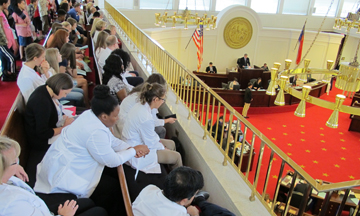NCNA News
Bill Introduced to Increase Access to Quality Healthcare and Lower Costs

February 14, 2017
RALEIGH – Lawmakers at the North Carolina General Assembly have introduced the Modernize Nursing Practice Act, a bill designed to reduce burdensome regulations and allow Full Practice Authority for Advanced Practice Registered Nurses (APRNs). Primary sponsors of HB 88 are Rep. Josh Dobson, Rep. Donny Lambeth, Rep. Sarah Stevens, and Rep. Gale Adcock. Primary sponsors of SB 73 are Sen. Ralph Hise, Sen. Louis Pate, and Sen. Joyce Krawiec.
“This legislation is long overdue for the patients of North Carolina. It allows some of the best nurses in healthcare to do exactly what they’ve been trained to do,” said North Carolina Nurses Association President Mary Graff. “North Carolina has a proud history of innovative nursing leadership, but this is one area where we are in catch-up mode to most of the rest of the country. These types of improved regulations have already proven to be safe and effective in dozens of other states.”
Unlike bills that are being considered for other professions, HB 88/SB 73 does not change the scope of practice of any nurses; it simply removes outdated and superfluous physician supervision requirements. Current regulations do not require physicians to actually “supervise” APRNs from the same city where they practice or even see any of their patients.
Dr. Chris Conover, a health economist at Duke University, conducted research in 2015 showing that APRNs have the potential to improve quality and access to healthcare while saving between $433 million and $4.3 billion per year in North Carolina. Go here to read the report.
“Modernizing North Carolina’s regulation of APRNs would allow North Carolina residents to enjoy better access to care of equivalent or better quality even as the health system sheds some avoidable costs in the process,” Conover said.
Conover’s conservative estimates conclude that expanding the use of APRNs would save North Carolina more than $430 million annually in health care costs while adding at least 3,800 jobs to the economy.
APRNs are some of the most highly-trained nurses in the profession, and require masters-level education. The four types of APRNs include:
- Nurse Practitioners
- Certified Nurse-Midwives
- Certified Registered Nurse Anesthetists
- Clinical Nurse Specialists
A similar version of this bill was introduced in 2015 with bipartisan support in both the House and the Senate.